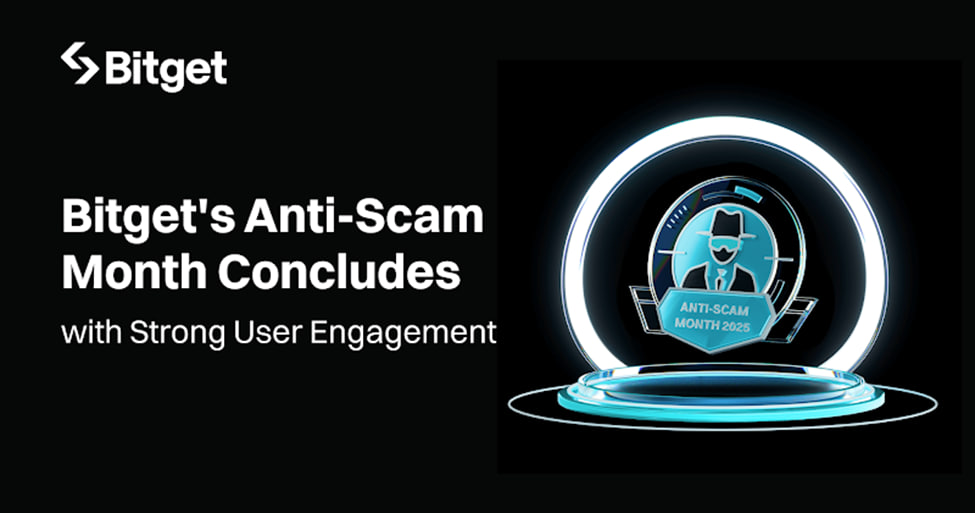Victoria, Seychelles, July 2 2025 — Bitget, the world’s leading cryptocurrency exchange and Web3 company, has successfully concluded its 2025 Anti-Scam Month, a global initiative aimed at elevating user awareness and resilience against Web3 fraud. Throughout June, Bitget rolled out a series of gamified education tools, expert collaborations, and industry research to confront the rising threat of AI-enabled scams and security breaches across the crypto ecosystem.
At the heart of the campaign was the Smarter Eyes Challenge, an interactive comic-based mini-game simulating real-life scam scenarios—from phishing and social engineering to fake token approvals. While only 8.60% of participants spotted all traps on their first attempt, a striking 65.41% eventually passed all three levels after receiving guided security clues, underscoring both the scale of the awareness gap and the campaign’s tangible impact.
Bitget published six in-depth blog posts tackling common attack vectors like SMS spoofing, fake apps, and high-risk tokens. Over 80% of users scored full marks in follow-up security quizzes, signaling a sharp improvement in scam detection capabilities following the campaign’s educational content.
Another flagship milestone was the release of Bitget’s 2025 Anti-Scam Research Report, co-authored with blockchain security leaders SlowMist and Elliptic. The report revealed that global crypto scam losses surpassed $4.6 billion in 2024, with deepfakes and social engineering responsible for the majority of high-value attacks. The findings spotlighted the growing sophistication of AI-driven fraud, including synthetic public figure videos, Trojan-laced job offers, and fake Zoom calls used to deceive victims.
Throughout the month, Bitget convened key voices in Web3 security—including Hacken, GoPlus, BlockSec, and Security Alliance—for an Anti-Scam X Space discussion. Experts weighed in on future threats, the evolving role of collaboration, and how users, platforms, and audit firms can work together to build a safer digital asset environment.
“Anti-Scam Month reflects our belief that education is the first line of defense in crypto security,” said Gracy Chen, CEO of Bitget. “By turning passive users into active defenders, we’re laying the groundwork for a more resilient ecosystem. And this is only the beginning—the Anti-Scam Hub will remain open year-round as a permanent resource for our global community.”
Echoing this sentiment, Yevheniia Broshevan, Co-Founder & CBDO at Hacken, said, “Anti-Scam Month by Bitget is a fantastic initiative and a powerful example for the industry, demonstrating how companies can raise awareness, educate users, and reduce the risk of future hacks. Education truly is a vital part of this journey.”
Yajin (Andy) Zhou, Co-Founder & CEO at BlockSec, added, “Hackers study user habits, such as copying addresses from transaction histories. Security efforts must focus on proactive defenses rather than blaming users. Security is not a solo battlefield. Blockchain platforms, compliance tools, and security firms must share threat intelligence to build a united defense system.”
Michael Lewellen, Technical Council at Security Alliance, emphasized, “Security isn’t about being impossible to hack or scam users. It’s just being hard enough to discourage threat actors from investing effort in the attempt. We need to harden Web3 infrastructure enough so that this ecosystem is no longer an easy, profitable target.”
The Bitget Anti-Scam Hub, now permanently live, offers users ongoing access to practical safety guides, real-time scam indicators, the official verification channel, and a crypto safety kit with 24/7 global support.
For more details, please visit the Bitget Anti-Scam Hub here.
Disclaimer: The information presented in this article is part of a sponsored/press release/paid content, intended solely for promotional purposes. Readers are advised to exercise caution and conduct their own research before taking any action related to the content on this page or the company. Coin Edition is not responsible for any losses or damages incurred as a result of or in connection with the utilization of content, products, or services mentioned.







